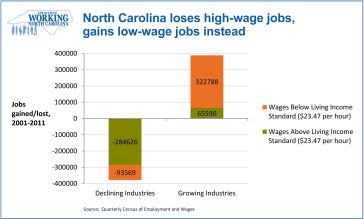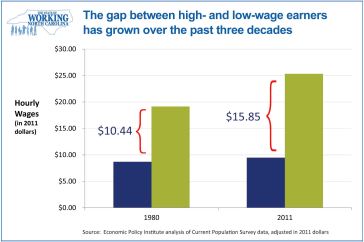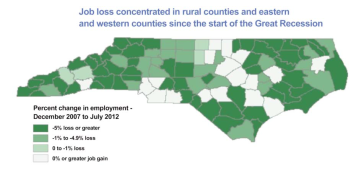Economic recovery characterized by low-wage job growth and growing inequality
September 4, 2012 at 11:26 am 11 comments
Two reports came out in light of yesterday’s Labor Day holiday. One from the Budget & Tax Center, “The State of Working North Carolina 2012,” which provides an analysis of the economic trends in the state and of the labor market. The second, from the National Employment Law Project, “The Low-Wage Recovery and Growing Inequality,” looks at the trends in jobs and employment in the recovery period between 2010 and 2012.
The main takeaway from these analyses is that, despite the fact that we’re in a period of recovery, inequality is rising in North Carolina and in the nation. During the 2000s, in the state, as in the nation, we had seen a decline in high-wage jobs, such as those in manufacturing or information sector, and a shift toward more low-wage jobs, such as administrative and waste industries (see the chart below). As a result, household income declined by 9.4% since 2001, down to early 19990’s levels by 2010. It shouldn’t be surprising, then, that poverty also increased by 24.1% during this time.
After the end of the Great Recession, unemployment, underemployment (where workers take part-time work when they are actually seeking full-time work), and long-term unemployment remain persistently high.
Job gains in the recovery have been predominantly in low-wage work, as the chart above shows. Nationally, since the first quarter of 2001, employment has increased 8.7% for low-wage jobs, increased 6.6% for high-wage jobs, but has dropped by 7.3% for mid-wage jobs.
The result is that the long-term trend of inequality is continuing and growing. In North Carolina, the wages for the bottom 20% of wage earners remained stagnant over the past 30 years, while those at the highest end of the wage spectrum saw gains (see below).
In addition, inequalities persist across race, gender, and geographic lines. Rural eastern and western counties of North Carolina were hit harder than other counties, as shown in the map below.
The State of Working NC report includes a host of policy solutions aimed at creating a more equitable economic recovery. These range from support for the unemployed, wage standards including increasing the minimum wage, and accountability in our state’s economic development resources. But as the report concludes:
But to truly create communities of opportunity in North Carolina, state policymakers must focus on the needs of low-income people with an eye on where they live and work. This vision requires policymakers to work across multiple policy silos in order to achieve integrated development.
Entry filed under: Economic Development, Economy, Jobs & Employment. Tags: Economic Development, Jobs, Unemployment.



1. Economic development investments create new jobs in Charlotte area « thesupportcenter | September 5, 2012 at 9:09 am
Economic development investments create new jobs in Charlotte area « thesupportcenter | September 5, 2012 at 9:09 am
[…] is particularly important given yesterday’s blog post on the growth of low wage jobs– and resultant income inequality– in both the nation and […]
2. Trends in economic growth in metro areas provides insight « thesupportcenter | October 2, 2012 at 11:11 am
Trends in economic growth in metro areas provides insight « thesupportcenter | October 2, 2012 at 11:11 am
[…] blogged before about the economic trends in rural areas during and after the Great Recession (here, here, and here), but The Atlantic Cities provides an analysis of the trends in metropolitan areas […]
3. Workers struggle to make ends meet as part-time jobs increase « thesupportcenter | October 29, 2012 at 2:39 pm
Workers struggle to make ends meet as part-time jobs increase « thesupportcenter | October 29, 2012 at 2:39 pm
[…] we have previously blogged about, the recovery period from this economic recession has been characterized by an increase in low-wage […]
4. On the brink of election, unemployment in rural America hits 4-year low « thesupportcenter | November 7, 2012 at 9:24 am
On the brink of election, unemployment in rural America hits 4-year low « thesupportcenter | November 7, 2012 at 9:24 am
[…] needs to be done before we can say that the recovery has been shared by all Americans. We know that rural areas face unique challenges that need to be addressed by our economic policies. Similarly, urban and suburban areas face their […]
5. Rural housing gap continues to widen « thesupportcenter | November 30, 2012 at 11:24 am
Rural housing gap continues to widen « thesupportcenter | November 30, 2012 at 11:24 am
[…] the divide between rural and urban areas, that has characterized this economic recovery (here, here, and here). Reducing– or, in some cases eliminating– funding for housing […]
6. 4 of NC’s rural counties among 50 with largest increase in poverty « thesupportcenter | January 14, 2013 at 11:34 am
4 of NC’s rural counties among 50 with largest increase in poverty « thesupportcenter | January 14, 2013 at 11:34 am
[…] underserved and economically challenged areas can be uplifted. Otherwise, we will continue on this lopsided economic path, with some areas prospering and others being left […]
7. The role of technology in the loss of middle-class jobs « thesupportcenter | January 23, 2013 at 11:23 am
The role of technology in the loss of middle-class jobs « thesupportcenter | January 23, 2013 at 11:23 am
[…] job loss today, this one looking at the role of technology. As we’ve blogged about before (here, here, and here), this recovery period, which began officially in June 2009, has been marked by […]
8. The minimum wage, small businesses, and the economy « thesupportcenter | February 14, 2013 at 11:07 am
The minimum wage, small businesses, and the economy « thesupportcenter | February 14, 2013 at 11:07 am
[…] economic recovery has been marked by a growth in low-wage jobs, in which some people and communities continue to […]
9. Dow might be up, but small businesses still struggling | thesupportcenter | March 6, 2013 at 10:57 am
Dow might be up, but small businesses still struggling | thesupportcenter | March 6, 2013 at 10:57 am
[…] priorities between the wealthy and general public, which we blogged about yesterday. There are fewer good jobs available, and while unemployment and underemployment remain persistently high– higher and for longer […]
10. “American Winter” film documents lives of 8 families after the Great Recession | thesupportcenter | March 18, 2013 at 11:52 am
“American Winter” film documents lives of 8 families after the Great Recession | thesupportcenter | March 18, 2013 at 11:52 am
[…] up against. We know that long-term unemployment remains high, that the jobs that are growing are low-wage jobs, that poverty is increasing, and that wages continue to stagnate as the cost of living continues to […]
11. USDA’s “Strike Force” initiative extended North Carolina | thesupportcenter | March 27, 2013 at 12:15 pm
USDA’s “Strike Force” initiative extended North Carolina | thesupportcenter | March 27, 2013 at 12:15 pm
[…] out of economic opportunity. The current economic recovery is also not doing much to improve the disparity between urban and rural, and between the rich and poor. Without proactive initiatives like Strike Force– and a focus on leveraging community […]